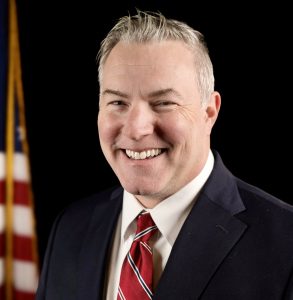Help with Fort Smith consent decree sought through political channels
by February 12, 2025 2:59 pm 998 views

There is some hope by Fort Smith officials that a new president in the White House or different agency oversight could give the city more flexibility with a federal consent decree requiring expensive sewer system improvements.
The issue was raised Tuesday (Feb. 11) by Director Neal Martin during a Fort Smith Board study session. The board and city staff were discussing ways to finance $360 million in bonds to meet obligations under the consent decree.
After decades of failing to maintain sewer infrastructure to federal standards, the city entered into a consent decree with the U.S. Environmental Protection Agency (EPA) and U.S. Department of Justice (DOJ) in late 2014. The consent decree, which began in January 2015, required the city to make an estimated $480 million worth of sewer upgrades in 12 years. That amount is now estimated to be as high as $800 million.
In May 2022, Fort Smith voters passed a 0.75% sales tax from Jan. 1, 2023, to Dec. 31, 2030, with 83.3% of the revenue going to federal consent decree work on the city’s water and sewer system, and 16.7% directed to the police department. Funding for consent decree work to date also has come in part from water and sewer bill increases, which are up 167% since 2015.
City officials recently worked to negotiate with the EPA and DOJ for more time and to submit a new financial plan to meet consent decree requirements. The agencies have yet to officially respond with an answer.
‘HEAVY-HANDED’
Martin said he was contacted by Rep. Cindy Crawford, R-Fort Smith, to ask about key Fort Smith issues prior to a meeting she was scheduled to have with Gov. Sarah Sanders. Martin said during the board meeting that he told Crawford he would appreciate anything the governor could do, especially considering her connection to President Donald Trump, to help the city with more favorable consent decree terms.

“Let me be clear — we are fully committed to fixing our sewer system,” Martin noted in an email to Crawford that was provided to Talk Business & Politics. “That has never been in question. Our concern lies with the EPA’s inflexibility over the life of the (consent decree) and the tremendous financial strain it has placed on our residents.”
Martin noted in his email to Crawford that the 2019 historic flood, the COVID-19 pandemic, and record inflation have made it difficult — financially and practically — to meet obligations in the original 12-year consent decree order. He also alleged that the federal agencies have become in recent months more “heavy-handed.”
“The EPA has refused to acknowledge the real challenges we’ve faced — historic flooding, a pandemic, and record inflation. They expect us to move forward as if none of this happened,” Martin noted. “We maintained a cordial relationship with the agency until August when they abruptly changed course, becoming heavy-handed and demanding a new financial plan that includes these additional rate increases, bonds, and tax reallocations. Simply put, the citizens of Fort Smith have done their part — our citizens have sacrificed immensely to fix a problem created generations ago. At this point, we need intervention. If there is anything Gov. Sanders can do — leveraging her connections with President Trump and EPA Administrator (Lee) Zeldin — to ease the burden of this consent decree or remove it entirely, it would be a tremendous relief to our community.”

The EPA and Arkansas Department of Environmental Equality in May 2020 did grant the city a five-year extension for consent decree work. Along with the five year extension, the EPA and ADEQ provided additional flexibility with certain project deadlines to allow the city more time for more expensive projects.
STATE AGENCY OVERSIGHT
Interim City Administrator Jeff Dingman, who was asked by Martin to also respond to Crawford’s outreach, noted in his email that the city “is committed to correcting the deficiencies in its wastewater system,” but needs more time so the capital obligations aren’t so onerous on the city and its residents.
“Fort Smith should have been afforded at least a 25-year consent decree from the beginning,” Dingman noted in his email to Crawford. “We are aware that DOJ/EPA at the time were set on ‘making an example’ of Fort Smith, and they were specifically motivated to get a consent decree in place before the end of 2014, which they did. As Director Martin mentioned, if there is an ask of the governor, the presidential administration, or the new leadership at EPA, it would be for additional time to complete the required work at a pace that our community can afford.”
Dingman also revealed in his email the possibility of consent decree enforcement being handled by Arkansas officials.
“Interestingly, I have heard of a possibility that enforcement of consent decrees such as ours might be something that the EPA could designate to the states,” Dingman wrote. “For the last few years, Fort Smith has focused on cultivating and improving its relationship with the Arkansas Department of Energy and Environment (ADE&E), specifically the Division of Environmental Quality as it relates to this consent decree and many other matters. We believe working with our fellow Arkansans has helped our cause with the DOJ/EPA in the last few years and would welcome the opportunity to work with ADE&E as our regulating agency for this consent decree. With the discussion of shifting some regulatory matters from the federal government to the states, this concept relating to consent decrees is of great interest to Fort Smith.”
Crawford on Wednesday provided this statement to Talk Business & Politics: “I did meet with the governor and asked for her help with the federal office of EPA or ask the Trump administration to loosen the hold on Fort Smith. She said she would get back with me when they looked everything over.”
Martin said Wednesday he is not sure what may come of any attempt to seek relief through the political system.
“It may not come to fruition at all,” he said. “There may not be any chance whatsoever. But I really want to use every tool that’s in our tool belt to get some relief. … I want us to use every opportunity to maybe make things easier for our citizens.”
